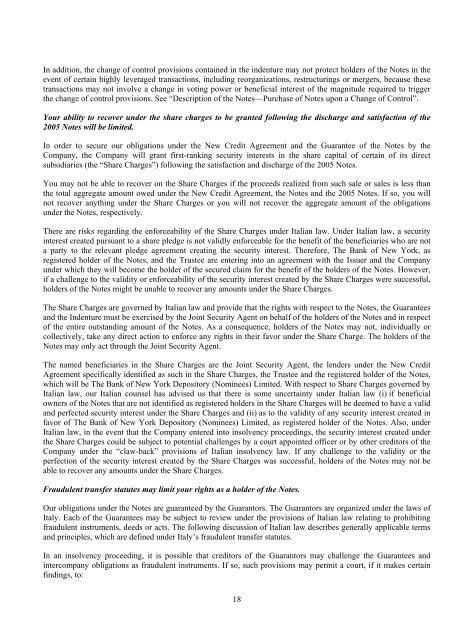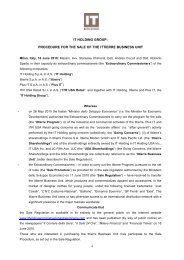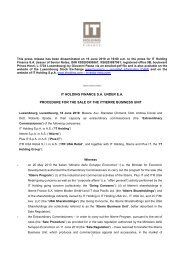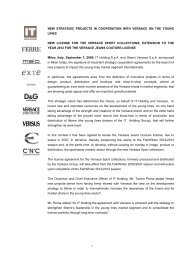Create successful ePaper yourself
Turn your PDF publications into a flip-book with our unique Google optimized e-Paper software.
In addition, the change of control provisions contained in the indenture may not protect holders of the Notes in the<br />
event of certain highly leveraged transactions, including reorganizations, restructurings or mergers, because these<br />
transactions may not involve a change in voting power or beneficial interest of the magnitude required to trigger<br />
the change of control provisions. See “Description of the Notes—Purchase of Notes upon a Change of Control”.<br />
Your ability to recover under the share charges to be granted following the discharge and satisfaction of the<br />
2005 Notes will be limited.<br />
In order to secure our obligations under the New Credit Agreement and the Guarantee of the Notes by the<br />
Company, the Company will grant first-ranking security interests in the share capital of certain of its direct<br />
subsidiaries (the “Share Charges”) following the satisfaction and discharge of the 2005 Notes.<br />
You may not be able to recover on the Share Charges if the proceeds realized from such sale or sales is less than<br />
the total aggregate amount owed under the New Credit Agreement, the Notes and the 2005 Notes. If so, you will<br />
not recover anything under the Share Charges or you will not recover the aggregate amount of the obligations<br />
under the Notes, respectively.<br />
There are risks regarding the enforceability of the Share Charges under Italian law. Under Italian law, a security<br />
interest created pursuant to a share pledge is not validly enforceable for the benefit of the beneficiaries who are not<br />
a party to the relevant pledge agreement creating the security interest. Therefore, The Bank of New York, as<br />
registered holder of the Notes, and the Trustee are entering into an agreement with the Issuer and the Company<br />
under which they will become the holder of the secured claim for the benefit of the holders of the Notes. However,<br />
if a challenge to the validity or enforceability of the security interest created by the Share Charges were successful,<br />
holders of the Notes might be unable to recover any amounts under the Share Charges.<br />
The Share Charges are governed by Italian law and provide that the rights with respect to the Notes, the Guarantees<br />
and the Indenture must be exercised by the Joint Security Agent on behalf of the holders of the Notes and in respect<br />
of the entire outstanding amount of the Notes. As a consequence, holders of the Notes may not, individually or<br />
collectively, take any direct action to enforce any rights in their favor under the Share Charge. The holders of the<br />
Notes may only act through the Joint Security Agent.<br />
The named beneficiaries in the Share Charges are the Joint Security Agent, the lenders under the New Credit<br />
Agreement specifically identified as such in the Share Charges, the Trustee and the registered holder of the Notes,<br />
which will be The Bank of New York Depository (Nominees) Limited. With respect to Share Charges governed by<br />
Italian law, our Italian counsel has advised us that there is some uncertainty under Italian law (i) if beneficial<br />
owners of the Notes that are not identified as registered holders in the Share Charges will be deemed to have a valid<br />
and perfected security interest under the Share Charges and (ii) as to the validity of any security interest created in<br />
favor of The Bank of New York Depository (Nominees) Limited, as registered holder of the Notes. Also, under<br />
Italian law, in the event that the Company entered into insolvency proceedings, the security interest created under<br />
the Share Charges could be subject to potential challenges by a court appointed officer or by other creditors of the<br />
Company under the “claw-back” provisions of Italian insolvency law. If any challenge to the validity or the<br />
perfection of the security interest created by the Share Charges was successful, holders of the Notes may not be<br />
able to recover any amounts under the Share Charges.<br />
Fraudulent transfer statutes may limit your rights as a holder of the Notes.<br />
Our obligations under the Notes are guaranteed by the Guarantors. The Guarantors are organized under the laws of<br />
Italy. Each of the Guarantees may be subject to review under the provisions of Italian law relating to prohibiting<br />
fraudulent instruments, deeds or acts. The following discussion of Italian law describes generally applicable terms<br />
and principles, which are defined under Italy’s fraudulent transfer statutes.<br />
In an insolvency proceeding, it is possible that creditors of the Guarantors may challenge the Guarantees and<br />
intercompany obligations as fraudulent instruments. If so, such provisions may permit a court, if it makes certain<br />
findings, to:<br />
18






